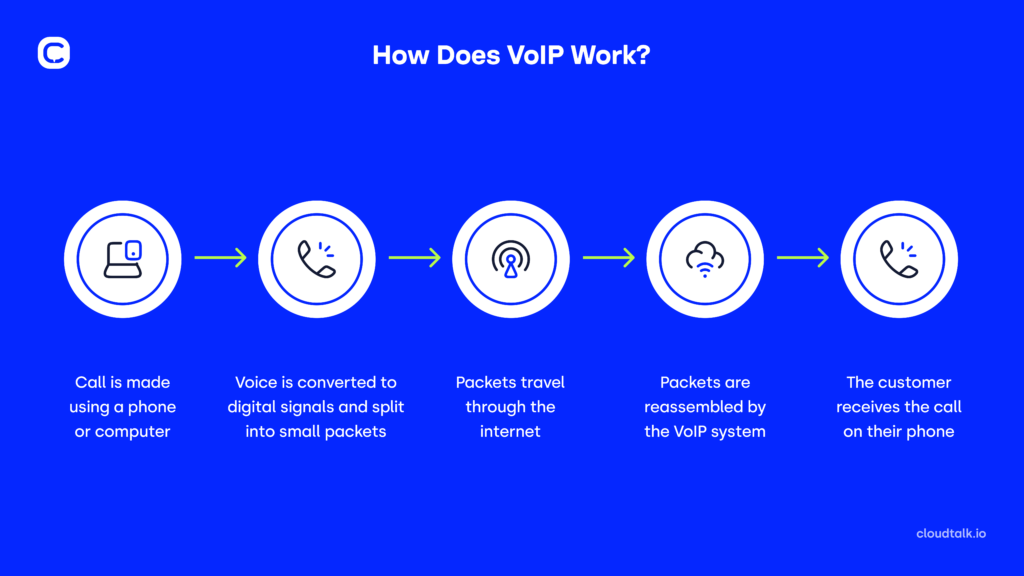What Is a VoIP Caller? Your Complete Guide

According to Allied Market Research, the global mobile VoIP market is projected to reach $327.5 billion by 2031. Imagine the volume of calls that will be made through VoIP!
If you’re curious about what a VoIP caller is and why businesses are increasingly relying on VoIP technology, you’re in the right place. Dive into our complete guide to learn what a VoIP caller is, how it works, and what are the main benefits of VoIP technology.
Key takeaways:
- A VoIP caller uses Voice over IP (VoIP) technology to make calls over the internet instead of traditional phone lines. This system converts voice into digital data and transmits it over the web, offering a modern alternative to traditional phone systems.
- VoIP technology benefits many sectors, including customer service, call centers, startups, and remote teams.
- Businesses use VoIP mainly for its cost savings, global scalability, productivity boosts, and reliable backup options.
What is a VoIP Caller?
A VoIP caller is the person or system that makes a call using VoIP (Voice over IP), a technology that allows voice calls over the internet instead of traditional phone lines.
Unlike traditional phone systems or the PSTN (Public Switched Telephone Network), VoIP has several advantages and key differences:
But why exactly should businesses, especially those entrepreneurial ventures with big dreams and bold ideas, set their sights on the international stage? Let’s unpack the compelling reasons that make global expansion a solid business idea:
Feature
VoIP
Traditional Telephone Systems
Technology
Uses the Internet to transmit voice as data.
Uses physical telephone lines (copper wires).
Cost
Generally affordable, especially for long-distance calls.
Can be more expensive, especially for international calls.
Flexibility
High: can be used anywhere with an Internet connection.
Limited to the location of the telephone line.
Advanced Features
It includes features like Virtual Voicemail and Call Transcription.
Basic features (calls, standard voicemail).
Scalability
Easy to scale; lines can be added or removed quickly.
Difficult and costly to scale; requires physical installation.
Activate Your 14-Day Free VoIP Trial– No Card Required!
How to Identify a VoIP Caller?
A VoIP number works much like a traditional phone number but is linked to the caller, not their location. This means you can use a U.S. phone number to make calls, whether on vacation or living in Costa Rica—the third-best country in Latin America for remote work.
When you receive a VoIP call, it can appear just like any other phone call. VoIP callers often use local numbers or show their caller ID, so there is no visible difference.
How Does VoIP Technology Work?
When you speak on a VoIP phone or app, your voice is initially captured as an analog signal. This signal is then converted into digital data using a codec, a software that compresses and prepares the voice data for transmission over the internet.
The digital voice data is split into small packets sent across the internet, similar to how emails or messages are transmitted. When these packets reach the recipient’s device, they are reassembled and converted back into an audio signal that the person can hear.

Curious About VoIP? Learn How It Works, Step by Step
Who Uses VoIP Callers?
VoIP technology is widely used across various sectors due to its cost-effectiveness and flexibility. Here are the main groups that use VoIP:
- Customer Service: Many companies use VoIP to quickly address customer complaints and technical inquiries. For example, you can integrate it with Customer Relationship Management (CRM) systems, allowing quicker and more personalized responses to questions and support needs.
- Call Centers: VoIP is essential for call centers because it lets them manage high volumes of incoming and outgoing calls with advanced features like Call Routing and Call Recording. For instance, a call center providing technical support for a software company can use VoIP to direct calls to different teams based on the specific issue reported.
- Startups and enterprises: Small and large companies use VoIP for their internal and external communication, avoiding the high costs of traditional phone lines. This flexibility helps them easily adjust to changes in staff size or office locations. For example, a tech startup can use VoIP to connect employees across different cities without needing physical phone lines.
- Remote teams: VoIP lets remote employees communicate with colleagues and clients without using their personal phone numbers, improving privacy and flexibility. This makes it easy for companies with employees working from home or in different countries to stay connected internally and with clients.
Why Do Businesses Use VoIP Callers?
Here are 4 main reasons why companies use VoIP callers:
#1 Save Money
One of VoIP’s biggest advantages is that it is more affordable than traditional phone systems. In fact, VoIP technology can reduce your monthly phone expenses by up to 50%.
With VoIP, companies can make international and long-distance calls at a much lower cost, which is especially useful for businesses with global operations or those looking to cut expenses.
Additionally, VoIP systems are more affordable and easier to maintain because they require less physical equipment. Updates and new features can be added remotely, saving on expensive technician visits. This leads to lower maintenance costs compared to traditional phone systems.
#2 Grow Easily
VoIP is very flexible and lets businesses operate from anywhere with an internet connection. Therefore, it’s much easier to expand globally and grow by saving costs and allowing international operations.
Moreover, VoIP systems make it easy to add or remove phone lines as needed. This allows businesses to adapt to size changes without incurring significant extra costs.
#3 Boost Productivity
VoIP integrates easily with other business tools, such as Customer Relationship Management (CRM) systems. These integrations simplify communication and keep all the information in one place. As a result, you reduce the time spent switching between different systems and increase operational efficiency, improving customer service.
Additionally, VoIP offers several features that help save time and reduce manual tasks. For example, with the Smart Dialer, you can populate call queues with numbers from any website, CRM, or HelpDesk tool and start calling with just a click.
#4 Ensure Reliability
VoIP systems are more reliable than traditional ones because they offer multiple backup options.
Imagine your computer breaks down; with VoIP, you can use your mobile phone to make calls and stay connected. In contrast, with traditional phone lines, if your phone breaks, you have to wait for a technician to fix it.
For instance, at CloudTalk, instead of depending on just one partner, we’ve developed strong relationships with telecom companies around the world. This helps us provide better call quality and more reliable connections. Plus, as a registered operator in several countries, we can manage many aspects of call quality ourselves.
Transform Your Communication Strategy with VoIP
In summary, VoIP callers use VoIP technology to make online calls rather than traditional phone lines. This approach offers several benefits, including lower costs, greater flexibility, and advanced features like virtual voicemail and call transcription.
Unlike conventional phone systems, VoIP lets you scale your business and integrates with other business tools, making it an attractive option for efficient and cost-effective communication solutions.
Ready to experience VoIP yourself? Take full advantage of crystal-clear call quality, low call rates, and access to 160+ international numbers. Schedule a demo today and see how CloudTalk transforms communication strategy.
Ready to scale your business with VoIP?
FAQs
Can businesses use more than one virtual number?
Yes, businesses can use multiple virtual numbers. This allows them to manage different departments, regions, or marketing campaigns with separate numbers while maintaining a unified communication system.
Should I answer a VoIP caller?
Deciding whether to answer a VoIP caller depends on the context. If you know the caller or have an expected reason for the call, it’s worth answering. However, be cautious with unknown or suspicious VoIP numbers, as they might be used for spam or scams.
Which VoIP callers are the best for businesses?
The best VoIP callers for businesses offer reliable quality, advanced features (like call routing and analytics), and strong customer support. Look for VoIP providers with scalable plans, good integration with other business tools, and secure, stable connections.
CloudTalk is a top choice for businesses due to its high call quality and suite of advanced features, such as IVR and Analytics. It also offers 24/7 customer support and scalable plans, and it integrates well with popular business tools while ensuring robust security and stability.
























